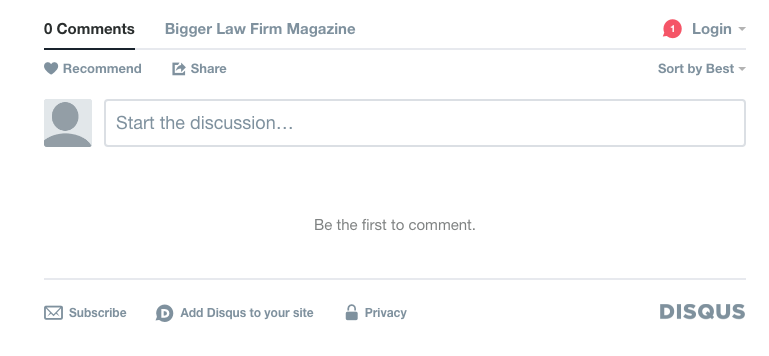Should Your Law Firm’s Website Allow Comments and Questions?
BY Brendan Conley

LISTEN
Should a law firm allow public comments on its website? Should attorneys answer questions from users? An attorney’s instinctual answer may be No. Attorneys answering questions from the public raises issues of potential malpractice liability, and website comment sections are notorious for attracting a low form of discourse. Law firms are also likely to want to maintain solid control over the content on the firm’s website. Why open Pandora’s box?
There are real concerns that should be addressed before a firm considers allowing website comments, and for many firms the well-considered answer may still be No. However, there are potential advantages that should also be evaluated. In fact, thousands of attorneys answer questions from the public online every day, and the practice has benefits in terms of boosting search engine results and bringing in prospective clients.
At the outset, it should go without saying that a firm’s policy on website comments must follow applicable state laws and ethical rules regarding attorney advertising and when an attorney-client relationship may be established. Let us also be clear that a firm should consider only a well-moderated comment section. Public comments should never be allowed to go live before they have been reviewed by firm staff. With that said, we examine some advantages and potential pitfalls of allowing public input.
User interaction
One of the primary advantages of allowing user comments and questions is that it permits interaction on the firm’s website. This can help portray the firm as a bustling hub of information, the place where everyone goes to get answers. When the firm responds to a user question with a friendly and informative answer, the user will often chime in with a message of thanks. This accomplishes several marketing goals: showing that the firm is dedicated to serving clients and solving problems, and providing a real-time positive “review” from a member of the public. Commenters can also become clients themselves. People with legal questions are often in the market for legal services, and are likely to choose a firm that has already given them a positive experience.
Comments and questions from users should fit within the image the firm wishes to project, in terms of both content and visual design. The look and feel of the website should be considered when designing a comments section, to make sure that comments do not detract from the desired professional image. Strict moderation is also an essential element. Inappropriate comments or questions should not be published. The comment form can be set to collect the user’s email address, so that firm staff can respond to the person privately if necessary. A comment form can also be programmed to allow users to sign in via Facebook or Twitter, displaying their profile photo next to their comment, or the form can be programmed to not post any user identity information publicly, or to permit anonymous questions, if the user chooses.
Free content
A firm that answers questions on its website performs a public service, but of course the firm benefits as well, and not only from the goodwill generated. A webpage that gives a 500-word answer to a general legal question is somewhat helpful to users and may generate some traffic from search engines. Add to that page 50 or 100 questions from users about how that situation may play out in individual circumstances, along with answers from the firm’s staff covering all those variations, and you may have the most comprehensive answer to that question published on the internet. Longer content often rises to the top of search engine results pages, bringing in more web traffic and more prospective clients. Google and other search engines keep the details of how they rank websites secret, but Google has confirmed that the content in comments and replies is considered along with the main content on the page in determining the value of that page for a specific search term.
Real-life FAQs
Of course, you might be able to create the same value by having firm staff make up 50 or 100 variations of a question and provide answers, but why would you? Allowing questions from real people on your site uncovers what people are actually searching for, which may not be what a firm’s marketing staff assumes they are searching for. The firm’s website development team can also use popular questions as topics for more in-depth content.
Online questions from the public and answers from attorneys are widespread, and sites that provide them are popular. Attorneys regularly answer questions on websites like lawguru.com, lawyers.com and justia.com with the expectation that the increased visibility on such popular sites will bring them into contact with prospective clients. In terms of boosting search results, answering questions on a third party site adds a lot of value to the third party site, and not much to the firm’s own website. Answering questions directly on the firm’s website cuts out the intermediary and delivers those benefits to the firm.
Liability and ethics
Adherence to state bar rules will guide a firm’s policy for online comments and questions, but there are two concerns that are general enough to discuss here.
First, it is crucial for the firm to make clear to users that an attorney-client relationship is not established by their use of the comment form, and that the answers do not constitute legal advice. An appropriate disclaimer should be posted on the website, but such a notice is not a cure-all. Rather, these facts should be made clear throughout any continuing interaction. The firm should treat website interactions with the same care that is given to communication with any prospective client, ensuring that there is no ambiguity as to whether or not an attorney-client relationship has been established.
The comments section may also state that public comments are obviously not confidential, that commenters should not post information that they wish to remain private, and that they may post anonymously or pseudonymously if they wish. Even with this warning, some people will attempt to post things they should not reveal publicly. In this circumstance, the firm may have an ethical duty to not allow people to incriminate themselves or cause harm to their position in a legal matter. This is another reason for strict moderation. If the comments form permits public anonymity but requires an email address, then the firm can respond privately to comments that should not be made public.
Dealing with negativity
Some people communicate more harshly online than they would in person, with the result that the comments sections of many websites seem filled with vitriol. Many law firms have encountered the related phenomenon of one unhappy client posting a negative online review, while 99 satisfied clients remain silent. On third party review sites, the solution is to enlist those happy clients to post positive reviews, drowning out the negative. On the firm’s own website, comments should be moderated. Simply put, do not allow anything to be published on your firm’s website that you do not want to have there.
Moderating a comments section is done best with a clear policy and some training for moderators. Spam comments, such as superficial messages that serve only to provide a link to some other website, can usually be eliminated with automated tools. Things like obscenity and hate speech can be banned outright. The firm can decide where to draw the line on unflattering or off-topic comments and questions, with the guiding principle that if it is not useful to readers, why publish it?
Time and attention
Moderating comments and answering questions undoubtedly take up staff time. As with any other marketing activity, the firm should engage in a cost-benefit analysis before diving in. If the firm accepts online questions and comments, then a procedure should be in place to ensure that responses are posted promptly. Every user of the firm’s website should be treated like a prospective client.
Proper attention should also be paid to the question of whether a law firm wants to allow comments and questions. In addition to the issues raised here, a firm may have its own reasons for favoring or disfavoring such a move. In certain practice areas, such as criminal defense, the risk of users incriminating themselves may outweigh the value of questions or comments. Other firms may feel that it is not possible to achieve the desired look and feel for their website if public input is included. However, for many firms, providing answers to questions may attract users and potential clients. The fact is, people are getting legal questions answered by attorneys on hundreds of websites every day. It is worth considering whether yours should be among them.
LATEST STORIES





